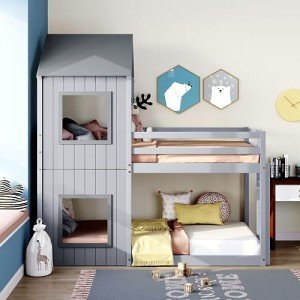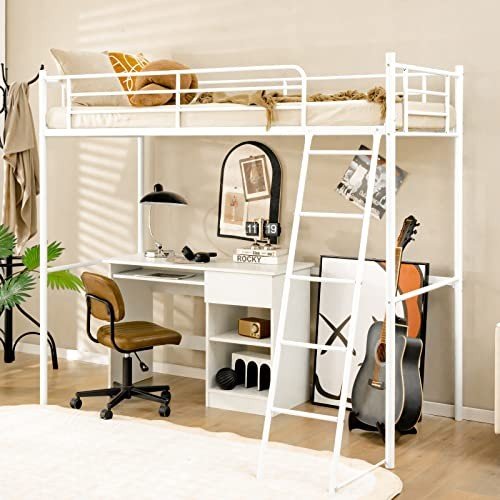kids_bunk_beds0891
About kids_bunk_beds0891
9 . What Your Parents Taught You About Bunk Bed

Bunk Beds: A Comprehensive Guide for Parents and Space Savers
Bunk beds have been a popular option for maximizing living space, specifically for households with several children or for roommates in college dorms. These space-saving beds been available in various designs and setups, making them not just useful however also a fun addition to a kid’s bedroom. In this short article, we will look into the advantages of bunk beds, types to think about, necessary safety features, and suggestions for selecting the best design for your home.

Benefits of Bunk Beds
Bunk beds offer various advantages that make them an attractive option for homeowners. Here are some of the most notable advantages:
-
Space Saving: Bunk beds increase sleeping space while using up just a small footprint in a space. This is specifically helpful in smaller sized bed rooms where flooring space is at a premium.
-
Affordable: By accommodating 2 or more people, bunk beds can be a more cost-effective choice than buying specific beds.
-
Versatility: Bunk beds can be designed with features such as desks, storage, or convertible layouts, using versatility to adapt to various requirements.
-
Enjoyable Factor: Children usually find bunk beds exciting. They can be a fun retreat that cultivates imagination and imagination.
-
Organization: With built-in drawers or racks, Bunk Bed Cheap beds typically offer extra storage options, assisting keep the room organized.
Table: Bunk Bed Advantages
| Advantage | Description |
|---|---|
| Space Saving | Accommodates numerous sleepers in the very same footprint. |
| Cost-efficient | Lowers the need for numerous beds, saving money. |
| Versatility | Can consist of extra features such as desks or storage. |
| Enjoyable Factor | Offers a distinct and interesting space for kids. |
| Company | Lots of models use additional storage options to keep the room tidy. |
Kinds Of Bunk Beds
When considering a bunk bed, understanding the various types readily available and their features can assist limit your choices. Here are some typical types of bunk beds:
1. Requirement Bunk Bed
A conventional model including one bed stacked on top of another.
2. Loft Bed
Comparable to a bunk bed, however the lower bed is eliminated, creating open space beneath. This space can be utilized for desks, play locations, or storage.
3. L-Shaped Bunk Bed
Two beds arranged in an L-shape, providing more floor space and frequently including additional storage or play locations beneath.
4. Triple Bunk Bed
Perfect for bigger households, a triple bunk bed accommodates three sleepers in a vertical plan.
5. Futon Bunk Bed
This style consists of a futon on the bottom, which can be transformed into a sofa when not utilized as a bed, using adaptability for guests or playtime.
6. Corner Bunk Bed
Uses corner space, making it suitable for spaces with limited wall space.
Essential Safety Features
When choosing a bunk bed, safety ought to be a leading concern. Here are some necessary safety functions to think about:
-
Side Rails: Ensure the leading bunk includes durable side rails to avoid falls.
-
Secure Ladder: A protected and easy-to-climb ladder is vital for accessing the upper bunk safely.
-
Strong Construction: Look for bunk beds made from top quality materials that can support the weight of the users.
-
Weight Limit: Check the producer’s weight limit to avoid overburdening the bed.
-
Non-Tip Design: Ensure the bed has a steady base to avoid tipping when children climb up or down.
-
Protective Guidelines: Familiarize yourself with standards set by organizations like the Consumer Product Safety Commission (CPSC) to guarantee the bed fulfills safety standards.
Choosing the Perfect Bunk Bed
Here are some suggestions to direct you in choosing the best bunk bed for your space:
-
Measure Your Space: Before shopping, measure the room measurements to guarantee the bunk bed will fit conveniently without crowding the space.
-
Consider the Age of Users: Children’s security is vital. Guarantee the design appropriates for their age group.
-
Assess Design Preferences: Choose a style and color that match the room’s design and show the users’ personalities.
-
Try To Find Extra Features: Consider consumers for designs with built-in storage, desks, or play locations that include flexibility.
-
Assess Assembly Requirements: Some bunk beds come ready to put together; check reviews for ease of assembly and stability once built.
-
Check out Reviews: Look for client feedback regarding sturdiness, comfort, and safety to inform your decision.
Table: Bunk Bed Safety and Buying Considerations
| Classification | Key Considerations |
|---|---|
| Security Features | Side rails, secure ladder, tough construction |
| User Age | Make sure bed is age-appropriate and satisfies security guidelines |
| Space Measurement | Confirm bed fits easily in designated area |
| Style Preferences | Pick a style that matches room decoration |
| Extra Features | Search for integrated storage, desks, or play areas |
| Assembly Process | Evaluate ease of assembly and stability post-construction |
FAQs
Q1: What age is proper for a child to oversleep the leading bunk?
A1: The top bunk is typically suggested for kids aged 6 and older due to the threat of falls and their capability to securely navigate stairs and ladders.
Q2: Are there weight limits for bunk beds?
A2: Yes, most bunk beds featured specified weight limits per bed, which is essential to check to ensure safety and resilience.
Q3: How can I make a bunk bed more comfortable?
A3: You can include a quality mattress that suits individual preferences, utilize mattress toppers for additional convenience, and buy soft bedding and pillows.
Q4: Should I use a box spring with a bunk bed?
A4: No, most bunk beds are developed to be utilized without a box spring; using one can increase the height, making it more prone to falls.
Q5: Can adults use bunk beds?
A5: Yes, there are bunk beds designed particularly to accommodate adults. Always check the weight limitation and construction quality before usage.
In conclusion, bunk beds offer a functional and innovative option for optimizing bedroom space, providing a variety of designs and practical features. By keeping safety in mind and thinking about the specific requirements of users, parents and caretakers can choose the best bunk bed that combines enjoyable, function, and safety.
No listing found.